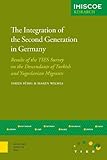The integration of the second generation in Germany : results of the TIES Survey on the descendants of Turkish and Yugoslavian immigrants / Inken S�urig and Maren Wilmes.
Material type: TextSeries: IMISCOE researchPublisher: Amsterdam : Amsterdam University Press, [2015]Copyright date: �2015Description: 1 online resource (195 pages) : illustrationsContent type:
TextSeries: IMISCOE researchPublisher: Amsterdam : Amsterdam University Press, [2015]Copyright date: �2015Description: 1 online resource (195 pages) : illustrationsContent type: - text
- computer
- online resource
- 9789048526970
- 9048526973
- IMISCOE research.
- Children of immigrants -- Cultural assimilation -- Germany
- Children of immigrants -- Education -- Germany
- Migration, immigration and emigration
- Social issues and processes
- Society and culture: general
- Society and social sciences Society and social sciences
- SOCIAL SCIENCE/Emigration & Immigration
- SOCIAL SCIENCE -- General
- Children of immigrants -- Education
- Germany
- Jugoslawischer Einwanderer
- T�urkischer Einwanderer
- Generation 2
- Soziale Integration
- Deutschland
- Germany
- Integration
- Migration
- Second Generation
- 304.8 23
- HB3595 .I58 2015eb
Includes bibliographical references (pages 189-195).
Preface: The international research project TIES -- 1. The integration of the second generation: Theoretical considerations -- TIES Germany: Method and data base -- 2. Migration history and basic demographic characteristics of the first generation -- The two cities under study: Berlin and Frankfurt -- The parents of the TIES respondents -- 3. Educational careers and educational outcomes -- Kindergarten and primary school -- The transition problem in the German school system -- The he transition from primary school to lower secondary: Recommendations for secondary schools and their ramifications -- Subsequent educational careers: Lower secondary school -- The first educational transition: From school to vocational training -- general tendencies -- Parents' educational background and academic support from family -- Sense of well-being at school -- Conclusions -- 4. Labour market positions -- Labour force participation and current work status -- Transition from the education system to the labour market -- Significance of the highest qualification for labour market position -- Occupational groups -- The respondents' financial situation -- Current work status in Berlin and Frankfurt -- Working conditions -- Career conditions and discrimination at work -- 5. Segregation and housing -- Second-generation Turks and Yugoslavs in Berlin -- Second-generation Turks and Yugoslavs in Frankfurt -- Comparison Berlin -- Frankfurt -- 6. Ethnic and cultural orientations -- Ethnic orientations -- Attachment to the parents' country of origin -- Religious orientations -- Intercultural orientations -- 7. Social relations -- Friendships -- Participation in public contexts -- Experiences of discrimination -- 8. Family formation and partner relationships -- Cohabitation, marriage, and procreation -- Ethnic, cultural, and socio-economic orientations in partner relationships -- Family life.
This report on the German results of the Integration of the Second Generation in Europe (TIES) survey looks at the integration process for second generation inhabitants of Turkish and Yugoslavian backgrounds living in Berlin and Frankfurt. Examining the TIES results, Inken S�urig and Maren Wilmes discuss diverse topics such as educational outcomes, segregation and housing, ethnic and cultural orientations, and social relations.
Print version record.
This work is licensed under the following Creative Commons License: Attribution-NonCommercial-NoDerivs 3.0 Unported (CC BY-NC-ND 3.0).
en.
eBooks on EBSCOhost EBSCO eBook Subscription Academic Collection - Worldwide

